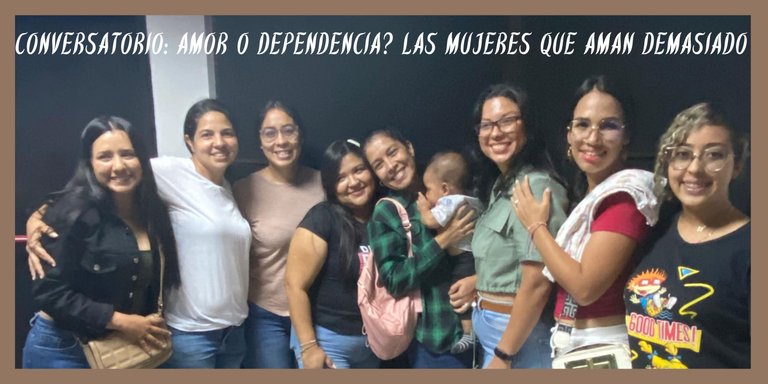Hello dear hive community! 😉
¡Hola querida comunidad de hive! 😉
Hace aproximadamente una semana tuve la oportunidad de asistir a un conversatorio en las instalaciones de la Iglesia Las Buenas Nuevas Multisede de la ciudad de Barquisimeto, el mismo tenía por nombre, Amor o Dependencia? Las mujeres que aman demasiado.
About a week ago I had the opportunity to attend a discussion at the facilities of the Good News Church Multisede in the city of Barquisimeto, the same had the name, Love or Dependence? Women who love too much.

Imagen realizada con la página web de diseño gráfico y composición de imágenes Canva // Image made with the graphic design and image composition website Canva.

Al principio cuando lo ví me causó muchas expectativas. Para comenzar es propicio preguntar, ¿Qué es el amor? Personalmente pienso que el amor es un sentimiento de afecto que sentimos por nuestros seres queridos, padres, familiares, amigos o por alguien del sexo opuesto. Sin embargo, la mayoría de las personas piensan que el amor solo se siente por un novio, pareja o cónyuge; cuando en realidad fue Dios quien experimentó el amor por primera vez, según Juan 3:16 dice “Que de tal manera amó Dios al mundo que dió a su único hijo para que todo en el que él crea sea salvó, más tenga vida eterna”.
At the beginning when I saw it, it caused me a lot of expectations. To begin with, it is appropriate to ask, what is love? Personally I think that love is a feeling of affection that we feel for our loved ones, parents, family, friends or someone of the opposite sex. However, most people think that love is only felt for a boyfriend, partner or spouse; when in reality it was God who experienced love for the first time, according to John 3:16 it says “God so loved the world that he gave his only son that everyone who believes in him may be saved and have eternal life”.

Allí podemos ver un amor tan grande, que sinceramente es casi imposible de experimentar para el ser humano, nadie puede dar un hijo para que muera por amor a otro, y partiendo de allí es que debemos reflexionar en algo, si Dios me ama tanto que dió su hijo por mi, creo que lo mínimo que podemos hacer es tratar de amarnos de la misma manera.
Es entonces donde entra otro concepto clave y es la dependencia emocional, el cual trata de un patrón de comportamiento, en el que una persona depende de manera excesiva de otra. La dependencia puede llegar a ser tan obsesiva, que las personas pierden su autonomía, autoestima y su mundo solo gira a través de otra persona que puede ser una pareja, amistad o familiar.
There we can see such a great love, that sincerely is almost impossible to experience for the human being, no one can give a child to die for the love of another, and from there is that we must reflect on something, if God loves me so much that he gave his son for me, I think the least we can do is to try to love each other in the same way.
This is where another key concept comes in, and that is emotional dependency, which is a pattern of behavior in which one person is overly dependent on another. Dependency can become so obsessive, that people lose their autonomy, self-esteem and their world only revolves around another person who can be a partner, friend or family member.

Ahora bien, el conversatorio hablaba acerca de las mujeres que aman demasiado o mejor dicho que desarrollan dependencia emocional. Resulta que existen algunas características que predominan en una mujer que aman demasiado. La primera de ellas, es que provienen de un hogar disfuncional y cuando nos referimos a esto estamos hablando de hogares donde faltó una de las figuras paternas, algo muy importante de acotar acá, es que no necesariamente un hogar disfuncional proviene de padre separados, sino que en ocasiones padres juntos también presentan disfuncionalidad, esto puede conllevar a que la niña en su adultez desarrolle dependencia.
La segunda de las características que tiene una mujer que ama demasiado es que trata de dar afecto a hombres necesitados de amor y/o hombres inaccesibles emocionalmente. Aquí es donde se puede ver a mujeres involucradas con hombres casados, ya que son hombre inaccesibles emocionalmente. Otra característica es que una mujer que ama demasiado tiene temor a que la abandonen y está dispuesta a esperar por él cambio del hombre que quiere. Es aquí donde se puede ver mujeres que piensan que el amor cambia, cuando en realidad el cambio de una persona debe ser interno y debe hacerse por sí mismo y no por complacer a alguien más.
Now, the discussion was about women who love too much or rather who develop emotional dependence. It turns out that there are some characteristics that predominate in a woman who loves too much. The first of them is that they come from a dysfunctional home and when we refer to this we are talking about homes where one of the paternal figures was missing, something very important to note here, is that not necessarily a dysfunctional home comes from separated parents, but sometimes parents together also present dysfunctionality, this can lead to the girl in her adulthood to develop dependence.
The second characteristic of a woman who loves too much is that she tries to give affection to men in need of love and/or emotionally inaccessible men. This is where you can see women involved with married men, since they are emotionally inaccessible men. Another characteristic is that a woman who loves too much is afraid of being abandoned and is willing to wait for change from the man she loves. It is here where you can see women who think that love changes, when in reality the change of a person should be internal and should be done for himself and not to please someone else.

La cuarta característica, es que las mujeres con demencia emocional lamentablemente tienen baja autoestima. Les cuesta desarrollar su identidad y es aquí donde se deben apropiar del amor de Dios y en su palabra cuando establece “ama a tu prójimo como a ti mismo”, entonces, ¿Cómo podemos amar a otros si no nos amamos a nosotros mismos?. El quinto elemento es, que se fantasea con la relación perfecta. Piensa que las relaciones de pareja son como cuentos de hada y lamentablemente no es así, las relaciones sentimentales son más complejas de lo que se piensa y cuando una mujer que ama demasiado se da cuenta de esto, fácilmente cae en decepción e incluso depresión.
El sexto elemento o característica, es que este tipo de mujeres son adictas a los hombres y al dolor emocional, con predisposición a las adicciones. En este caso es importante acotar que solo se tiene adicción al alcohol, drogas o cualquier sustancia; también existe la adicción al sexo, al trabajo, a las compras, a los juegos de azar, entre otros. Por otra parte, este tipo de mujeres o las mujeres que presentan esta condición dejan pasar sus propias necesidades, mayormente siempre están dispuestos para ayudar a otros sino importar sus gustos, deseos, necesidades. Son complacientes y les cuesta poner límites saludables. También tienen tendencia a episodios depresivos, y es que les cuesta asimilar el dolor, las malas decisiones y se deprimen con mucha facilidad.
The fourth characteristic is that women with emotional dementia unfortunately have low self-esteem. They find it difficult to develop their identity and it is here where they must appropriate God's love and in his word when he states “love your neighbor as yourself”, so how can we love others if we do not love ourselves. The fifth element is, you fantasize about the perfect relationship. She thinks that relationships are like fairy tales and unfortunately it is not so, relationships are more complex than you think and when a woman who loves too much realizes this, she easily falls into disappointment and even depression.
The sixth element or characteristic is that this type of women are addicted to men and emotional pain, with a predisposition to addictions. In this case it is important to note that addiction to alcohol, drugs or any substance is not the only addiction; there is also addiction to sex, work, shopping, gambling, among others. On the other hand, this type of women or women who present this condition let their own needs pass, mostly they are always willing to help others regardless of their tastes, desires, needs. They are complacent and find it difficult to set healthy boundaries. They also have a tendency to depressive episodes, and it is difficult for them to assimilate pain, bad decisions and they get depressed very easily.

Sin embargo, no todo está perdido y es importante entender que el 99% de las mujeres nos identificamos al menos con dos de estás características porque lamentablemente nuestra cultura latina siempre nos ha enseñado que el amor es sufrimiento, desde las telenovelas, series, canciones, películas, nos han llevado a ser mujeres que aman demasiado. Pero la gran pregunta es, ¿Qué podemos hacer?
However, all is not lost and it is important to understand that 99% of women identify with at least two of these characteristics because unfortunately our Latin culture has always taught us that love is suffering, from soap operas, series, songs, movies, we have been led to be women who love too much. But the big question is, what can we do?

Lo primero, es reconocer que somos mujeres dependientes emocionalmente y no debemos sentirnos menos por esto, después de reconocer y aceptar debemos poner en práctica lo siguiente:
1- Buscar ayuda
2- El proceso de recuperación debe ser su prioridad
3- Incorporarse a un grupo de mujeres con el mismo perfil
4- Desarrolle una mayor intimidad con Dios
5- Deje de manejar y controlar a su pareja
6- Aprenda a no engancharse en los juegos
7- Asuma con responsabilidad sus errores y defectos
8- Cultive lo que necesita desarrollar en usted misma.
9- Vuélvase egoísta
10- Comparta con otros los logros de su proceso, lo que ha aprendido y experimentado.
The first thing to do is to recognize that we are emotionally dependent women and we should not feel less because of this. After recognizing and accepting this, we should put the following into practice:
1- Seek help
2- The recovery process should be your priority
3- Join a group of women with the same profile.
4- Develop a greater intimacy with God
5- Stop managing and controlling your partner.
6- Learn not to get hooked in games.
7- Take responsibility for your mistakes and shortcomings.
8- Cultivate what you need to develop in yourself.
9- Become selfish.
10- Share with others the achievements of your process, what you have learned and experienced.


Ya para despedirme, agradezco a quienes se tomaron unos minutos de su tiempo para leer mi publicación y me encantaría poder leer en los comentarios sus opiniones e impresiones sobre el tema.
In closing, I would like to thank those of you who took a few minutes of your time to read my publication and I would love to read in the comments your opinions and impressions on the subject.

Translator Deepl



Congratulations, your post has been curated by @dsc-r2cornell. You can use the tag #R2cornell. Also, find us on Discord
Felicitaciones, su publicación ha sido votada por @ dsc-r2cornell. Puedes usar el tag #R2cornell. También, nos puedes encontrar en Discord
Gracias por el apoyo @dsc-r2cornell
~~~ embed:1862279318803816848?t=sWX5_3mABWb4_zSsU_kDNA&s=19 twitter metadata:SUxvdmVQaHlzaWNhfHxodHRwczovL3R3aXR0ZXIuY29tL0lMb3ZlUGh5c2ljYS9zdGF0dXMvMTg2MjI3OTMxODgwMzgxNjg0OHw= ~~~